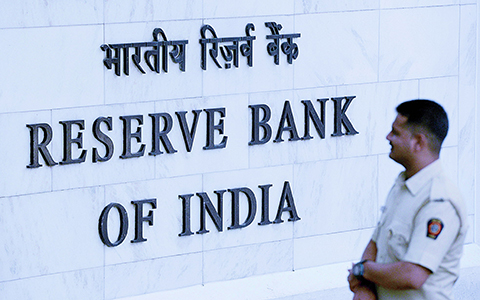
MUMBAI: An Indian policeman walks through the Reserve Bank of India (RBI) head office in Mumbai yesterday.-AFP
MUMBAI: India's central bank yesterday cut interest rates for the first time in almost a year amid sluggish growth and record-low inflation in the world's fastest growing economy. The Reserve Bank of India announced the benchmark repo rate-the level at which it lends to commercial banks-would be cut by 25 basis points to 6 percent, a near seven-year low. The interest rate last sat at 6 percent in September 2010.
The cut-the first since last October-was predicted by 41 of 57 economists polled by Bloomberg News, with the rest anticipating no change. Finance Minister Arun Jaitley called for a reduction in the key policy rate in June after retail inflation fell sharply from 2.18 percent to 1.54 percent the lowest since the government started tracking it in its current form in 2012.
New Delhi has kept an inflation target of 4 percent, with room for a 2 percent increase or decrease. The June data was the first time the lower end of that band has been breached, experts said. Rates are set by a six-member committee at the central bank. RBI governor Urijit Patel said four voted for a cut of 25 basis points, while one pushed for double that and another for rates to remain unchanged. Patel said low inflation and the successful rollout of the national Goods and Services Tax on July 1 helped steer the decision.
"These factors... opened up some space for monetary policy accommodation," he told reporters. The bank's previous decision to cut rates came a month before Prime Minister Narendra Modi removed all large-denomination banknotes from circulation, in a shock move to tackle corruption and tax evasion. The controversial policy was blamed for putting the brakes on India's economic expansion.
Growth slowed in the fourth quarter ending in March to 6.1 percent, but the government defended the pain as necessary to clean up corruption rife throughout the economy. Experts have predicted further disruption to the economy as businesses adjust to the Goods and Services Tax. While most economists expected the cut, not all thought it would be useful.
"There's been a 175 bps (basis points) cut since January 2015 up till the last monetary policy (meeting). If that hasn't made any difference to investment and credit off-take, how will this 25 bps cut do anything?" said Sunil Sinha, principal economist at India Ratings & Research. "There are bigger problems in the economy. If there is no demand or overcapacity, 25 bps cut won't make any difference." Madan Sabnavis, chief economist at CARE Ratings, had expected the key interest rate to remain unchanged.
"I was fairly surprised by the cut," he told AFP. "The fundamental problem is of demand. Industry won't invest just because there's been a 25 bps cut." The government welcomed the move and called it "an important step necessary to converge toward the appropriate real monetary conditions for sustained growth consistent with India's potential and for stable, moderate inflation". - AFP










